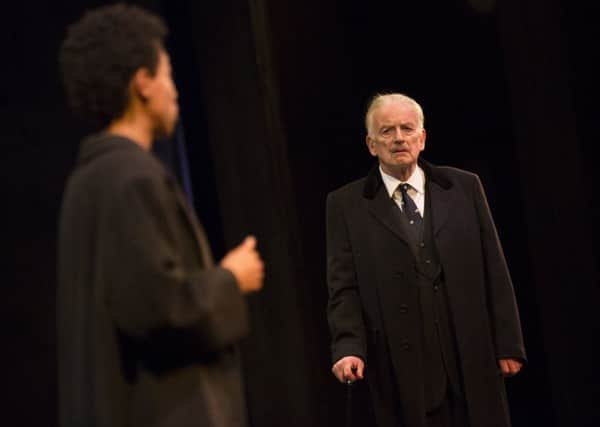Theatre interview: Chris Hannan on his new play at the Lyceum,What Shadows


It is a Birmingham story about a Birmingham man, inspired by one of the most controversial events in that city’s great history. Yet when Birmingham Rep’s artistic director Roxana Silbert began her search for plays reflecting the life of the city, back in 2011, she might well have expected playwrights to avoid the idea of a drama based on the events of 20 April 1968, when the then Conservative MP for Wolverhampton South West, the Rt Hon Enoch Powell, stood up at the city’s Midland Hotel to make what would become known as his “rivers of blood” speech, denouncing the wave of immigration from the “New Commonwealth” that had transformed some British cities since the 1950s, and opposing any legislation to outlaw race discrimination.
At the time, opinion polls suggested that as many as 80 per cent of British citizens might support Powell’s views, and Powell’s office was inundated with letters of support; but Edward Heath sacked him immediately from the Conservative Shadow Cabinet, and his speech was widely condemned as perhaps the most inflammatory and provocative in the history of British race relations. So when the Scottish playwright Chris Hannan, now based in Coventry, heard the call for plays about Birmingham, he was almost irresistibly drawn to the story of the unresolved tensions behind Powell’s speech, which still seem to haunt British politics today, in the age of Brexit; the tension between an anti-racist elite, publicly pursuing ideals of inclusion and equality, and a white working class some of whom, at least, feel neglected and deeply threatened by social and economic change, including immigration, over which they have no control. Now, Hannan’s play What Shadows – first seen in Birmingham last November, and starring the great Scottish actor Ian MacDiarmid as Powell – is about to receive its Scottish premiere at the Lyceum; and Hannan is still confident that he made the right decision in deciding to reawaken the story of Powell’s speech, and the extraordinary passions it aroused.
Advertisement
Hide Ad“I think my aim was to try to find a way of talking about hatred, without stirring up hatred,” says Hannan, as he prepares to head up to Scotland for the play’s Edinburgh premiere. “I was certainly never interested in just stirring up controversy with the play – as if we need that in Britain at the moment with the country so deeply divided that it seems half of the people just can’t understand a word the other half is saying.
“What struck me about Powell, though, was the fact that from childhood, he was a man absolutely consumed by the question of identity – with the symbols of British national identity, and with his passionate love for his idea of the country. And as a Scot, who grew up in a Catholic family at a time when sectarian racism was rife in the west of Scotland, I could identify with that. As a child, I was also obsessed with the symbols of identity – with Irish flags and Celtic shirts and the songs and the culture; then beyond that, there was the question of our relationship to the idea of Scotland, and of Britain.
“One of the stories of my generation of Scots, I think, is of how we began to move beyond those hostile communities towards a wider debate about Scotland, about how you build a country that can accommodate all these groups, and begin to move forward. In that sense, I think we’ve got something to contribute to the wider debate in Britain at the moment. I feel that I know how it feels to be part of a minority that suffers discrimination, and whose lives are dominated by identity issues for that reason; and also that I know the feeling of clinging fiercely to an identity that matters to you, and which you feel is under threat – and you can certainly sense that in Powell’s speech.”
Whether the country for which Powell had such a strong, nostalgic passion was Britain or England is an open question, of course. His love affair seemed to be with an ideal of rural England, which he – like many of his generation – thought of as standing for Britain as a whole; and Silbert’s Birmingham Rep production, with design by Ti Green, reflects on that English idyll. Yet the play also uses a double time-frame to bring Powell’s ideas into a dialogue with British citizens a generation on, in the 1990s; and Hannan is certain that there are issues raised in Powell’s speech that have never been fully dealt with in British politics, or fully answered, even today.
“My experience tells me that one of the dangers in this kind of debate is demonising the opposition, and just dismissing them as evil,” says Hannan. “In the same way, now, you can’t just demonise elements of the white working class for voting for Brexit, or call them irrational. And likewise, you can’t tell English people that they shouldn’t feel English, any more than you can tell Scots not to feel Scottish. When it comes to identity, you have to work with the feelings people have, and try to bring them into a more positive, open debate; you can’t just ignore or suppress them, which is essentially what seemed to happen after Powell’s speech.”
“Powell was absolutely a romantic nationalist,” adds Hannan, “and he was also an incredibly theatrical person, fascinated by the theatre and symbolism of national identity – you only have to read the so-called ‘rivers of blood’ speech to see that. So I am never going to say that I like the man; I find many of his views completely abhorrent. But I am willing to say that I can identify with him in some respects; and for me, that’s where the dialogue – and the drama – begins.”
What Shadows is at the Royal Lyceum Theatre, Edinburgh, until 28 September.